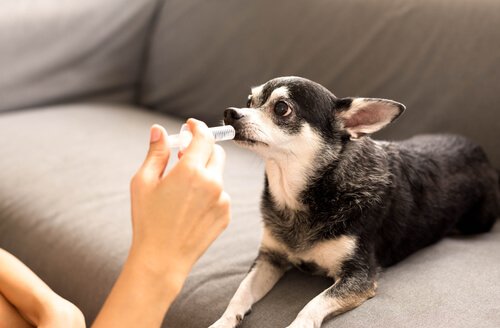Urinary Infections in Dogs: causes and treatments

Urinary infections in dogs are more common than you might think. They cause dogs a lot of pain and discomfort, especially around the kidneys and other areas of the urinary tract. In this article, you can learn about the causes, treatments, and how to tell if your dog has a urinary infection.
Causes of Urinary Infections in Dogs
There are many different things that can cause urinary infections in dogs. Sometimes, it can develop without showing any visible symptoms. This is why regular veterinarian appointments are very important because the vet could help identify if your dog has, or is close to having a urinary infection.
The most common causes of a urinary infection are:
- Bacterial infections
- Endocrine illnesses
- Prolonged administration of drugs
- A build-up of stones in the urethra
- Fungal infections
- Urinary incontinence
- Traumatism
- Cancer
- Prostate illness
- Abnormalities in the bone marrow or other congenital condition
Symptoms of Urinary Infections in Dogs
A urinary infection has a number of symptoms that can help you tell if your dog has one. However, you should still go to the vet as soon as possible in order to get a proper treatment. With that said, there are examples of cases where the infection provides no external symptoms at all.

It’s important to recognize any changes in your dog’s behaviour or personality. It could make a difference when it comes to getting treated on time. Here are some of the most common signs of a urinary infection:
- Blood in the urine
- Fever
- Urinary incontinence
- A greater quantity of urine or more frequent urination
- Excessive licking of the genitals
- Strong smelling urine
- An extra effort required to urinate
- Weight loss
- Lethargy
- Pain when applying pressure on the lower part of his back
These symptoms are a sure sign that something is not right with your dog’s urinary tract. Although the most common explanation is an infection, it could be something much worse, so don’t hesitate to go straight to your vet.
Treatment
Your vet will determine the most appropriate treatment for your dog. As mentioned before, this infection can be caused due to a variety of factor and each one will require a different course of treatment. The first thing that your vet will do, will be taking a urine sample and analyzing it.
The presence of white blood cells in your dog’s urine will be a sign that there is an infection caused by bacteria or stones in the urinary tract. Normally, this test is enough to diagnose a urinary infection and find a way to treat it. However, if your dog has more intense symptoms, it’s possible that your vet may want to run more tests to see how far the infection has spread.

Treatment will depend on the type of infection and how far it has spread. In general, these are the most common treatments:
- Antibiotics
- Medication
- Change in diet
- Increased water intake
- Urine alkalizers or acidifiers.
- Intravenous fluid therapy
- In more serious cases, surgery
- Treating the underlying illness. Sometimes, a urinary infection can be caused by another illness.
What can you do?
Although your dog has been diagnosed and now has the right treatment, there are still some things you can do to speed up his recovery. Here are a few tips:
Basic cleanliness and hygiene
This is really important because if your dog has an infection, it’s much easier for them to be affected by dirt, which can be a source of bacteria. If your dog has an infection and you don’t keep have a clean, you run the risk of getting sick yourself.
Medication
Remember to give them their medications according to schedule. Of course, don’t give them anything that’s not prescribed by your vet or change the dosage unless your vet says advice otherwise.
Clean water
Give your dog clean and fresh water at all times and expect them to drink a lot more than usual. If you notice that this is difficult for him, you can help him with a needless syringe. Water is critical for this condition, especially if it affects the kidneys.
No cuddling
This sort of infection can cause discomfort in several parts of your dog’s body, so you shouldn’t give your dogs any sort of cuddles or hugs. Don’t feel so sad because your dog already knows you love him.
If your dog has a urinary infection don’t worry so much because they are quite common and rarely cause complications. They’re easy to treat and with these tips, you’ll be doing a lot to help your dog.
Urinary infections in dogs are more common than you might think. They cause dogs a lot of pain and discomfort, especially around the kidneys and other areas of the urinary tract. In this article, you can learn about the causes, treatments, and how to tell if your dog has a urinary infection.
Causes of Urinary Infections in Dogs
There are many different things that can cause urinary infections in dogs. Sometimes, it can develop without showing any visible symptoms. This is why regular veterinarian appointments are very important because the vet could help identify if your dog has, or is close to having a urinary infection.
The most common causes of a urinary infection are:
- Bacterial infections
- Endocrine illnesses
- Prolonged administration of drugs
- A build-up of stones in the urethra
- Fungal infections
- Urinary incontinence
- Traumatism
- Cancer
- Prostate illness
- Abnormalities in the bone marrow or other congenital condition
Symptoms of Urinary Infections in Dogs
A urinary infection has a number of symptoms that can help you tell if your dog has one. However, you should still go to the vet as soon as possible in order to get a proper treatment. With that said, there are examples of cases where the infection provides no external symptoms at all.

It’s important to recognize any changes in your dog’s behaviour or personality. It could make a difference when it comes to getting treated on time. Here are some of the most common signs of a urinary infection:
- Blood in the urine
- Fever
- Urinary incontinence
- A greater quantity of urine or more frequent urination
- Excessive licking of the genitals
- Strong smelling urine
- An extra effort required to urinate
- Weight loss
- Lethargy
- Pain when applying pressure on the lower part of his back
These symptoms are a sure sign that something is not right with your dog’s urinary tract. Although the most common explanation is an infection, it could be something much worse, so don’t hesitate to go straight to your vet.
Treatment
Your vet will determine the most appropriate treatment for your dog. As mentioned before, this infection can be caused due to a variety of factor and each one will require a different course of treatment. The first thing that your vet will do, will be taking a urine sample and analyzing it.
The presence of white blood cells in your dog’s urine will be a sign that there is an infection caused by bacteria or stones in the urinary tract. Normally, this test is enough to diagnose a urinary infection and find a way to treat it. However, if your dog has more intense symptoms, it’s possible that your vet may want to run more tests to see how far the infection has spread.

Treatment will depend on the type of infection and how far it has spread. In general, these are the most common treatments:
- Antibiotics
- Medication
- Change in diet
- Increased water intake
- Urine alkalizers or acidifiers.
- Intravenous fluid therapy
- In more serious cases, surgery
- Treating the underlying illness. Sometimes, a urinary infection can be caused by another illness.
What can you do?
Although your dog has been diagnosed and now has the right treatment, there are still some things you can do to speed up his recovery. Here are a few tips:
Basic cleanliness and hygiene
This is really important because if your dog has an infection, it’s much easier for them to be affected by dirt, which can be a source of bacteria. If your dog has an infection and you don’t keep have a clean, you run the risk of getting sick yourself.
Medication
Remember to give them their medications according to schedule. Of course, don’t give them anything that’s not prescribed by your vet or change the dosage unless your vet says advice otherwise.
Clean water
Give your dog clean and fresh water at all times and expect them to drink a lot more than usual. If you notice that this is difficult for him, you can help him with a needless syringe. Water is critical for this condition, especially if it affects the kidneys.
No cuddling
This sort of infection can cause discomfort in several parts of your dog’s body, so you shouldn’t give your dogs any sort of cuddles or hugs. Don’t feel so sad because your dog already knows you love him.
If your dog has a urinary infection don’t worry so much because they are quite common and rarely cause complications. They’re easy to treat and with these tips, you’ll be doing a lot to help your dog.
This text is provided for informational purposes only and does not replace consultation with a professional. If in doubt, consult your specialist.







